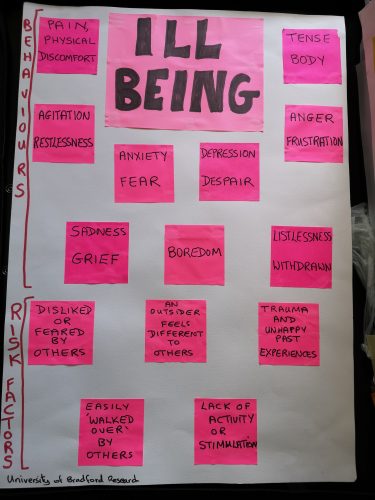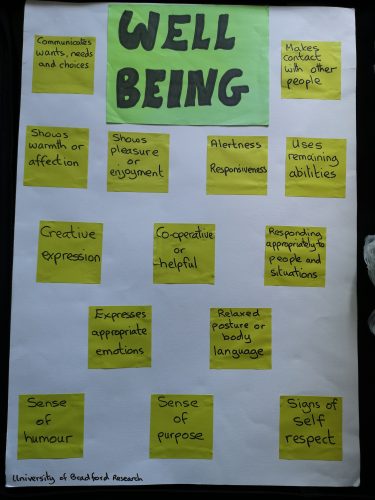ILL-Being Indicators
Are you familiar with the term ‘Well-Being’? Have you considered that the opposite is therefore ‘Ill-Being’?
Well-Being and Ill-Being are important markers for detecting a person’s level of health and wellness. This is especially relevant if that person has dementia.
Knowing the signs allows us to recognise what is happening. If we see signs of Ill-Being, we can understand, empathise and try to tackle the root cause. If the cause is not treated then ill-being will escalate. This will cause problems not only for the person, but also for their loved ones.
When a person has dementia, it can be hard for them to communicate. This may mean they cannot explain the cause of any upset or hurt to their family/carer. They may not understand it fully themselves. It therefore helps enormously if we can understand and provide solutions for them.
Behaviours and Risk Factors
`Research by Bradford University identified these behaviours and risk factors associated with ill-being in a person with dementia.

The team of researchers continued the person-centred work started by Tom Kitson at Bradford University in the late 1990s. The team developed Dementia Care Mapping, each positive or negative behaviour being given a score.
By recognising relevant behaviours and risk factors, we can identify and address causes for Ill-Being. By also encouraging situations which enhance Well-Being, people living with dementia can live better with the disease.
Implications for everyone?
So, as we unravel the signs and their implications, perhaps we should take a few moments to check if any of these apply to other people we care about…and ourselves!
Are you a carer? Dementia Carers are at an increased risk to their health and well-being. It would not hurt to see if any of the Ill-Being signs or risk factors apply to you. If you recognise any of the signs, then at least you will have some notice that this needs to be addressed before it becomes worse.
Well-Being Indicators
Knowing the indicators for Well-Being also helps us to recognise behaviours we should encourage. Knowing the person’s (or our own) preferences and history can help to identify activities which will promote these behaviours.

Comparison Chart
Here is a comparison chart to help you recognise signs of ‘Well-Being’ and ‘Ill-Being’ in yourself or someone you care about. Perhaps you could make a note of those which apply.
Encourage activities which promote Well-Being. Reduce activities or triggers for Ill-Being. Try scoring these one month apart and record any improvement. You should find that health and well-being will be noticeably improved.
Well-Being Ill-Being
Communicates wants, needs and choices Pain / Physical Discomfort
Sense of purpose Agitation / Restlessness
Co-operative or helpful Anxiety / Fear
Shows pleasure or enjoyment Depression / Despair
Shows warmth or affection Anger / frustration
Relaxed Posture or body language Tense Body
Sense of humour Sadness / Grief
Creative expression Boredom
Alertness / Responsiveness Listlessness / Withdrawn
Uses remaining abilities
Expresses appropriate emotions
Uses remaining abilities
Makes contact with other people
Responding appropriately to people and situations
University of Bradford Research – Dementia Care Mapping
Self-Care
Do you look after yourself properly? Most of us are not good at Self-Care. We think that care for others should always take priority, so our own needs are neglected. In order to care for others effectively, however, we need to be in good health ourselves. It is not selfish to take care of our own health, it is essential! If we become ill, who will do the caring? Self-Care is vital maintenance which we must perform on ourselves. No need to feel guilty!
Have a look at our article about the Stress Bucket to understand this better.
